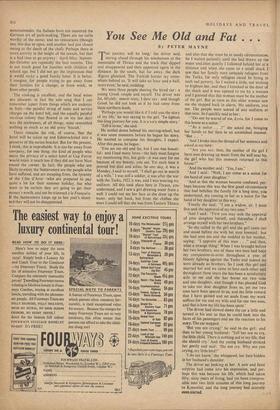You See Me Old and Fat . .
By PETER MAYNE
HE journey will be long,' the driver said, I staring ahead through his windscreen at the mountains of Thrace and the track that dipped and disappeared and then appeared again in the distance. In the south, but far away, the dark ./Egean glistened. The Turkish border lay some- where behind us. 'It will take an hour and a half, more even,' he said, nodding.
We were three people sharing the hired car : a young Greek couple and myself. The driver was fat, fiftyish: nearer sixty, I dare say : and though Greek he did not look as if he had come from these northern lands.
`Perhaps you would like it if I told you the story of my life,' he was saying to the girl. `To lighten this long journey for you. It is a very simple story.'
`Tell it to me,' she said.
He settled down behind his steering-wheel, but it was some moments before he began his story. He wanted to compose his thoughts, I expect. After this pause, he began :
'You, see me old and fat, but I. too was beauti- ful : and I had many loves—the lady must forgive. my mentioning this, but girls—it was easy for me because of my beauty, you see. Yet each time it proved but dust and ashes. So one day, it was a Monday, I said to myself, "1 shall go out in search of a wife." I was still a soldier, it was after the war with the Turks, 1922 it was, and I was wearing my uniform. All this took place here in Thrace, you understand, and I saw a girl drawing water from a well. I could not see her face as she drew up the water, only her back, but from the clothes she wore I could tell that she was from Eastern Thrace
and also that she must be in needy circumstances. So I waited patiently until she had drawn up the water andAhen quietly I followed behind her at a distance and when she came to a small shack saw that her family were certainly refugees from the Turks, for only refugees could be living in such sad poverty. So 1 waited a little, not wishing to frighten her, and then I knocked at the door of the shack and it was opened to me by a.woman and I guessed that this woman must be the mother of the girl. But as soon as this older woman saw me she stepped back in alarm. My uniform, you see. The people were scared of any uniform at that time. So I quickly said to her :
' "Do not be scared of me, kvria, for I come to this house as a suitor."
"As a suitor . . .?" she asked me, bringing her hands to her face in an astonished manner. "But . .
`And 1 broke into the thread of her sentence and asked in my turn :
' "Are you not, then, the mother of the girl I have seen drawing up water from the well near by, the girl who has this moment returned to this house?"
`And the mother said : "Yes, 1 am."
`And I said : "Well, I am come as a suitor for the hand of your daughter."
`And at this the woman became confused, per- haps because this was the first good circumstance that had befallen the family for a long time, you understand, my coming to her as a suitor for the hand of her daughter in this way.
'Finally she said : "I am a widow, sir. I must first seek the approval of my two sons."
`And 1 said : "First you may seek the approval of your daughter herself, and thereafter I shall arrange myself with her two brothers."
`So she called to the girl and the girl came out and stood before me with her eyes lowered : but she had seen me and she nodded to her mother, saying : "1 approve of this man . . ." and then, what a strange thing! When I was brought before her two brothers, one of these two men had been my companion-in-arms throughout a year of bloody fighting against the Turks and indeed we were already as brothers. So I took this girl and married her and we came to love each other and throughout these years she has been a satisfactory wife to me and she has borne me two sons and one daughter, and though it has pleased God to take our dear daughter from us, yet our two sons have been spared to us, and the little reward that I have gained and set aside from my work suffices for me and my wife and for our two sons, and that is how my life has been spent.'
The driver had slowed down the car a little and turned in his seat so that he could look into the faces of his passengers and see the reaction to his story. The car stopped.
Tut you are crying!' he said to the girl: and then to her young husband: 'Tell her not to cry, the little child. There is nothing sad in my life, that she should cry.' And the young husband stroked her gently and said : `Do not cry. Why are you crying, my little bird?'
'I do not know,' she whispered, her face hidden in her husband's shoulder.
The driver sat looking at her. A new and faint surprise had come into his expression, and per- haps this was because his life, which had taken fifty, sixty years of living, had yet been compres- sible into two little minutes of this long journey to Komotini, and the long journey had scarcely cm started. ?










































 Previous page
Previous page